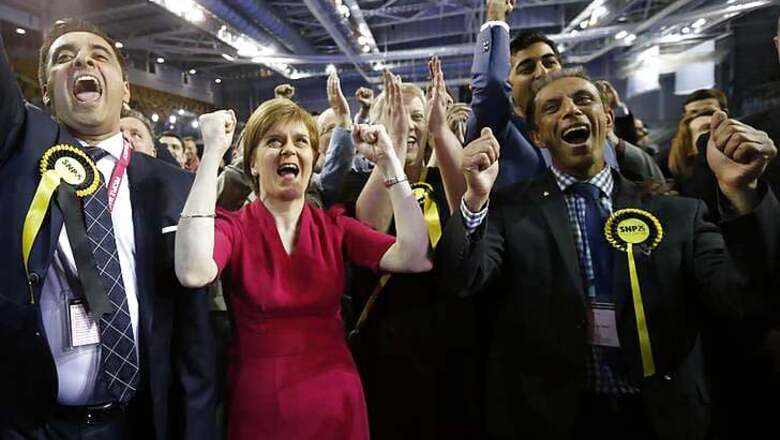
views
Glasgow/Aberdeen: Scottish nationalists rampaged to victory north of the border in Britain's national election, obliterating their opponents and setting the stage for a new battle over independence.
In an epic performance, the Scottish National Party (SNP) ousted the leader of the Labour Party in Scotland and took former Prime Minister Gordon Brown's onetime stronghold in Kirkcaldy.
Labour's UK campaign chief Douglas Alexander lost his Scottish seat to a 20-year-old politics student, the SNP's Mhairi Black, the youngest British member of parliament since the 17th Century.
With results in for all but one of Scotland's 59 seats, the SNP had won 55, with the Conservatives, Labour and Liberal Democrats managing only one apiece.
"The Scottish lion has roared this morning across the country," former SNP leader Alex Salmond said after triumphing in the Gordon constituency in Aberdeenshire.
"Scotland has asked to speak with a united voice, that voice will be made clearly for Scotland in the next Westminster parliament," said Salmond, whose campaign to lead Scotland to independence was defeated last September.
But with Prime Minister David Cameron's Conservatives on course for overall victory, the SNP will be shut out of any role in the British government - a scenario likely to bring a new confrontation over Scottish aspirations for independence.
The SNP had hoped for a kingmaker role in the House of Commons in a leftist alliance with Labour to force Cameron out.
Its landslide makes the political divide between England and Scotland starker than ever. England accounts for 85% of the population of the United Kingdom, which also includes Northern Ireland and Wales.
"It has serious implications for the United Kingdom as a political union. Whatever government is formed after this election will need to seriously consider its constitutional structure," said Murray Stewart Leith, senior lecturer in politics at the University of West Scotland.
The SNP, which took just six seats in 2010, secured a clean sweep in Glasgow, whose large working-class had been solidly Labour for decades.
Alistair Carmichael, Scottish secretary in the government in London, held on to the Orkney and Shetland seat for the Liberal Democrats and David Mundell, the only Conservative from Scotland in the previous parliament, was re-elected in Dumfriesshire in the south. Labour kept Edinburgh South.
Liberal Democrat Danny Alexander, treasury secretary in Britain's coalition government and the most powerful Scottish politician in the cabinet, was trounced in Inverness in the Highlands.
'DISUNITED KINGDOM'?
SNP leader Nicola Sturgeon said in Glasgow: "Tonight, the Scottish people have put their trust in the SNP to make Scotland’s voice heard and to stand up for progressive politics, and that’s exactly what we intend to do."
"This election wasn’t about independence. I promised people in Scotland that I wouldn’t take anybody’s vote as an endorsement of independence."
The results will nonetheless bolster Scots to push for a new referendum after separatists lost one last September.
Former editor the Scotsman newspaper Magnus Linklater said: "You are going to get a bunch of SNP MPs (members of parliament) going down to Westminster for whom independence is the ultimate goal, and pressure will build up."
Since the referendum, many Scots have become disillusioned with Labour, seeing it as having moved too far away from the left. Some in Scotland deride Labour as "Red Tories", using the alternative name for the Conservatives.
Despite Sturgeon's words, her opponents say the SNP's aim was undoubtedly to push for a second referendum. Not all SNP voters are pro-independence, however, and polls show that the sentiment on that issue has not changed much since last year's referendum.
Cameron's Conservatives had described the prospect of Labour and the SNP running Britain as a recipe for chaos and the potential break-up of the United Kingdom.
One potential confrontation is over Cameron's promise to hold a vote by the end of 2017 on whether Britain should leave the European Union, which Sturgeon has said would be against Scotland's wishes.
"Europe will be the trigger," Linklater said.
Ian Davidson, who lost his Glasgow South-West seat, told: "This is more than a disappointing result for Labour in Scotland, this is simply cataclysmic."
"Cameron has played the English nationalism card very well. He’s been prepared to imperil the union for partisan advantage."




















Comments
0 comment